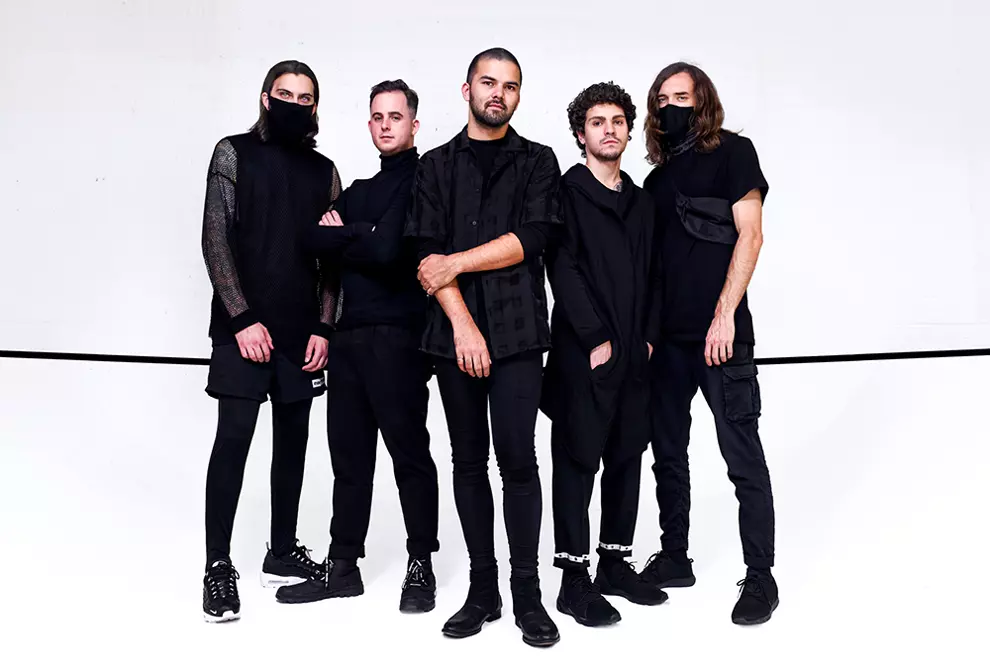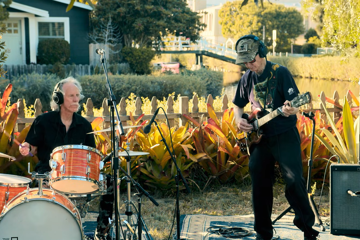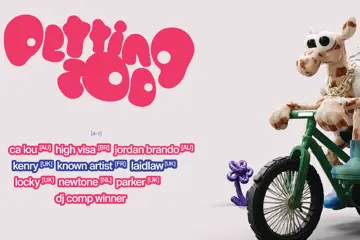 Northlane
NorthlaneCONTENT WARNING: This article contains discussion of domestic violence and addiction. If you are suffering from any of the issues that have been discussed or need assistance, please contact Lifeline on 13 11 14 or 1800RESPECT on 1800 737 732.
In the dying light of a mild winter day in Tokyo, Sydney metalcore five-piece Northlane are laying low. Having spent the day "enjoying being the Aussies wandering around Japan", the band are content to potter about their temporary home before the last night of a three-show run. After notching up ten years as a band, the guys are starting to see familiar faces in the crowd, even at international shows.
“I think when you respect the fans and show them that respect, they want to keep coming back,” vocalist Marcus Bridge explains. “We've been lucky to build these fanbases where we now know a lot of these people and see a lot of familiar faces.
“It's been growing steadily since I've joined. And the response we've got from the new songs already has been way more overwhelming than I thought it would be.”
Bridge welcomes this fleeting respite in Japan – because 2019 is a big year for Northlane. The tail-end of the year will be a whirlwind of more international and local touring in support of their fifth album, Alien.
Don't miss a beat with our FREE daily newsletter
Compared with previous releases, Alien is Northlane’s heaviest album since they started out in 2009. Writing it was a slow-burn, with the band revelling in the rare – for them – joy of taking more than 18 months to explore and indulge in more diverse soundscapes and off-kilter sonic flourishes than ever before. The heavier sound reflects their heavy subject matter – joining the band in 2014, Bridge felt it was finally time for him to lyrically address a childhood living with violent, heroin-addicted parents.
"I wanted people to be able to relate to these situations but I also wanted it to feel uncomfortable and to feel like it was coming from a bad place, because that’s what it was,” Bridge explains. “There’s only so much you can say about going through hardship and coming out the other side – I have been able to do that but that’s not the important part. This stuff happens and not too many people talk about it.
“People will joke about heroin over thinking it’s a serious problem. In the end, it’s important to make it an uncomfortable subject, something that’s not glamorous in any way, so that it’s not something people would even dream of doing.
"This album is very close to my heart but I have no idea what people are going to think of it. There’s been a lot more feedback than anything we’ve done before, especially with only a few songs out before the album is released. But I think that does come from people being able to relate to this story. Hopefully there’s going to be something positive to come out of something really negative.”
It's difficult to fathom the anxiety anyone might feel in laying bare such a grim family history to fans and newcomers. With his younger sister, Bridge spent much of his childhood at the mercy of his parents’ drug and gambling addictions, evading criminals banging on the front door and the brutal hands of his father whenever he could.
In an album woven from tales of fear, anger and survival, single Bloodline is just the tip of the iceberg: “I can’t escape you/ No matter how far I run/I can’t erase you/From who I’ve become.” This unravelling of personal history is somewhat cathartic for Bridge, but he’s confident it offers a journey for the listener too.
“When you're in these situations, there's something that's almost subliminal about it," he explains. “When we were younger my sister and I would always favour mum’s company, because she wasn’t violent. Yet my dad would demand, ‘Why do you always run to your mum?’ But so many people go through this all the time - not knowing how your dad is going to react is not a way any kid should grow up. If you can’t expect affection in a good way, you don’t know any different. You remember those things that you experienced, and they may not seem major at the time but you remember them and how you felt.
“I guess it was something I always wanted to write about and talk about, and I had floated the idea to the dudes in the past of talking about this – not necessarily basing a whole album on it – but I was never ready or comfortable to start telling it. I think coming out of the past two to three years we had all been working hard and having big ups and downs in our personal lives. It was not something we were thinking about writing a whole album on, but I think once the first couple of songs started getting written, like Bloodline, we realised that there was a lot to talk about.
"I think these songs deal with very important issues that don't get spoken about.”
Bridge poured one of the bleakest times in his past into this album – is that something he and Northlane would be open to doing again on a future album?
“Whatever we want to write at the time is what we’re passionate about. If this is something we want to keep writing about then, yeah, I’m sure we will,” he offers.
Musically, Alien packs in the usual onslaught of tight, arrhythmic guitars and kit work, but there’s a multitude of subtle moments that support the solid stuff. Regardless, it’s their most intense, heavy album to date. “I think the music and the vocals mirrored each other in the end,” Bridge says. “The stars aligned when we started writing this album. The tone of everything was way darker than anything we'd done before.
“In the past we just haven’t had ample time to hone in on all the details that we wanted to explore. That’s not to say that we’re not really proud of our other albums, but there are always albums where you could spend more time tweaking or changing things around. But for this we spent 18 months or more writing and recording, which meant we could be so picky with the little instrumental things. And for the first time ever we really could change musical parts to fit a vocal or cut bits out because we wanted to – in the past we’ve had to push forward to get it out.
“It’s the heaviest thing we’ve done in a long time but it has a lot of elements that you wouldn’t expect in heavy music, so there is a bit of juxtaposition with it all, which I think is really cool. Being able to make these songs feel the way they do in the music and the vocals meant that we could bring this pretty diverse but complete picture of what we wanted to life.”
















